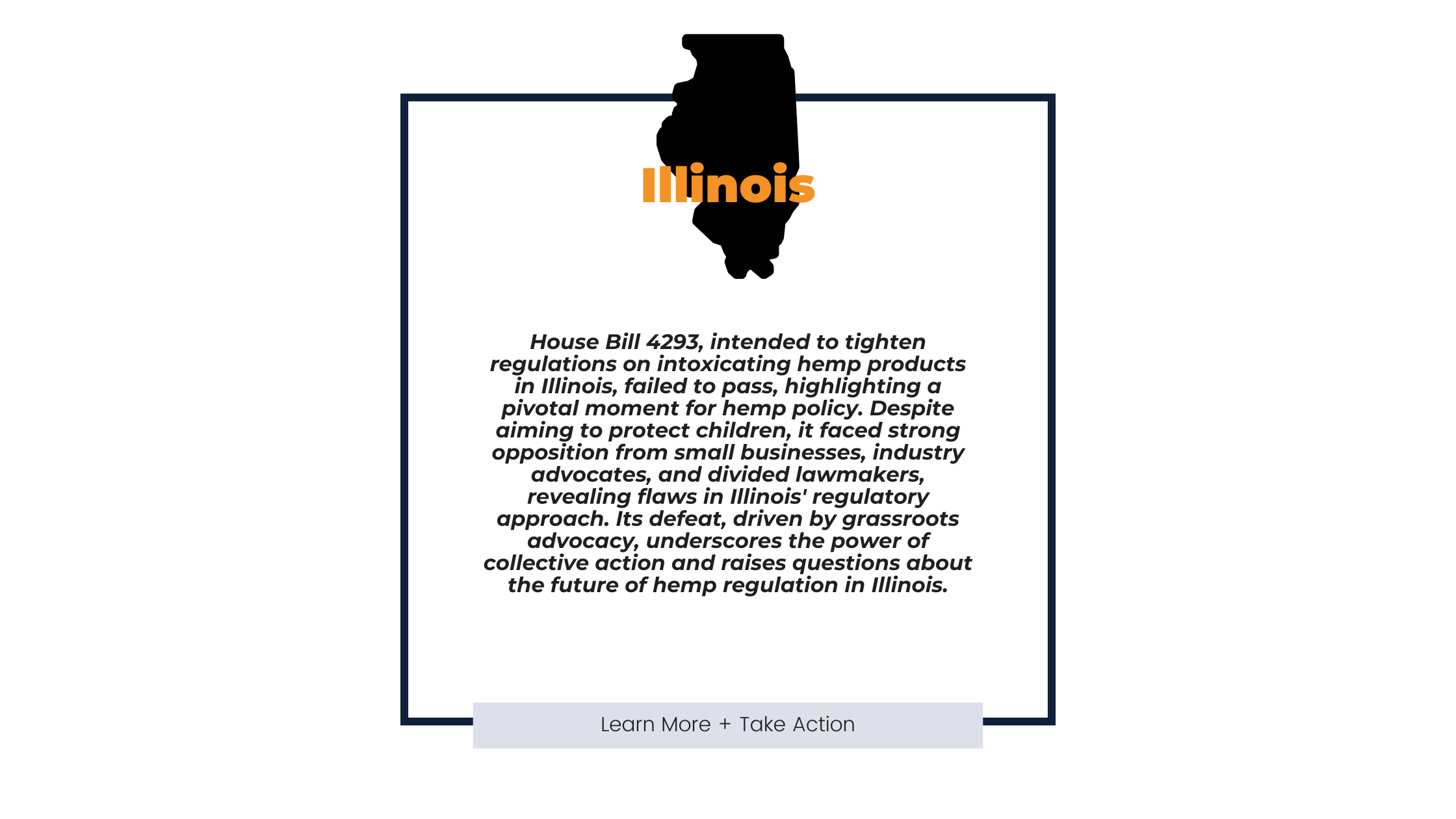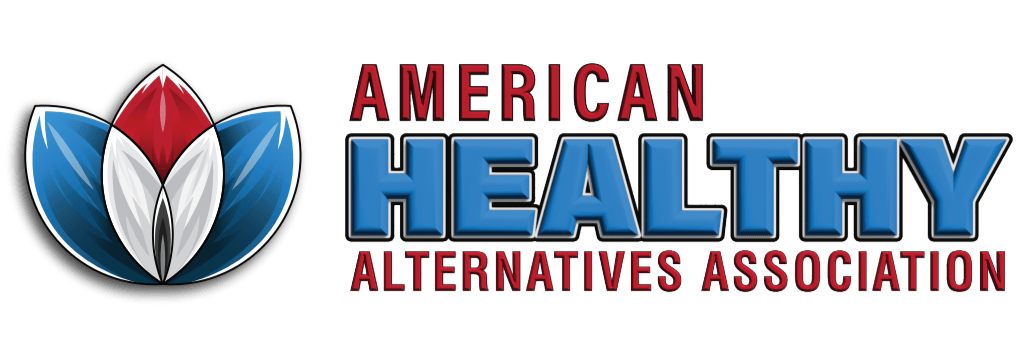
The Failure of HB 4293: What It Means for Illinois Residents
When House Bill 4293, an ambitious yet controversial effort to regulate intoxicating hemp products in Illinois, failed to pass in the state legislature last week, it marked a significant turning point for the hemp industry and public health policy across Illinois. Backed by Governor J.B. Pritzker and framed as a public health priority, the bill sought to ban products with Delta 8 THC marketed toward children. Despite its intentions, HB 4293 met strong opposition and ultimately fell short of success. This development highlights not only the power of public and industry advocacy but also the larger implications for hemp regulation and public health in Illinois.
We may have won this battle—but the war is far from over.
Breaking Down House Bill 4293
What It Proposed
House Bill 4293, also known as the Hemp Consumer Products Act, aimed to tighten regulations on intoxicating hemp products by reclassifying them under the “cannabis” umbrella. This would have placed THC-containing hemp products under the same stringent oversight as those governing cannabis. Among its key points, the bill:
- Sought to ban Delta 8 THC products packaged to resemble candy or other snacks marketed toward children.
- Aimed to close a regulatory loophole allowing certain hemp-derived intoxicating products to evade existing state laws.
- Intended to protect public health from accidental ingestions, particularly by young children.
At first glance, the bill may seem like a logical public health step, yet its language risked sweeping legitimate hemp businesses into regulatory chaos. Small businesses that play by the rules, such as those focused on offering health-oriented CBD products, could have faced significant economic challenges.
Initial Support
The bill found initial success, passing overwhelmingly in the Senate. Governor Pritzker championed the legislation, emphasizing its role in safeguarding public health and minimizing accidental consumption of THC by children. The Senate’s support signaled momentum for the proposed law—but the House of Representatives proved a different story entirely.
A Divided Democratic Stance
Opposition Grows
When HB 4293 reached the House, the bill encountered immediate scrutiny, revealing deep divisions among Democrats. Chicago Mayor Brandon Johnson emerged as one of the most prominent critics, arguing that the legislation lacked nuance and disproportionately impacted businesses within his jurisdiction.
Additionally, hemp industry advocates—from small business owners to major players in the American Healthy Alternatives Association and Illinois Healthy Alternatives Association—rallied against the bill. Many argued that the proposed law’s broad strokes would unnecessarily jeopardize the livelihood of many independent operators while limiting consumer access to lawful products like CBD oils and tinctures.
Behind Closed Doors
The House Democratic Caucus held a three-hour closed-door meeting that was anything but cordial. Eyewitness accounts describe the meeting as "spirited" or even "raucous," with harsh criticism directed at Governor Pritzker’s staff, highlighting tensions over the bill’s scope and implementation.
The opposition culminated when House Speaker Emanuel "Chris" Welch opted not to call the bill for a floor vote, citing a lack of support within his caucus. Governor Pritzker decried the decision as "irresponsible," arguing that the bill would have passed if introduced to a full vote.
The Role of Grassroots Advocacy and Lobbying Efforts
One of the key forces behind the defeat of HB 4293 was the strong advocacy from hemp supporters and grassroots campaigns. Last year, nearly 2,000 emails were sent by supporters opposing hemp product bans across Illinois. That wave of vocal opposition brought attention to the potentially devastating economic impacts HB 4293 would have had on small hemp businesses.
Special interest groups that supported the bill faced counter-lobbying from consumer advocacy groups and trade organizations like the Illinois Healthy Alternatives Association, whose efforts helped amplify the voices of those concerned about overregulation. Without this active pushback, the story may have turned out very differently.
Lessons Learned and Looking Ahead
The failure of HB 4293 leaves an important question unanswered—how can Illinois regulate intoxicating hemp products without stifling innovation or hurting small businesses? Governor Pritzker’s dissatisfaction with the bill’s failure indicates this issue is far from resolved. His administration may pursue alternative pathways, including reintroducing a revised version of the bill during the next legislative session or even considering executive action.
However, alternatives must provide nuanced solutions:
- Protect vulnerable populations, especially children, from potential harm.
- Empower, rather than punish, compliant businesses that adhere to regulatory standards.
- Ensure consumers have access to safe, reliable hemp products.
Call to Action
State legislators and policymakers need to hear from you. Vocal constituents can steer the conversation toward fair and balanced regulation—one that doesn’t inadvertently harm legitimate businesses or limit consumer access to safe alternatives.
What can you do?
- Contact your local representatives and urge them to consider a balanced approach to hemp regulation.
- Share your story if this industry impacts you directly—whether as a business owner, an advocate, or a consumer.
- Stay informed. Follow organizations like the American Healthy Alternatives Association for updates on legal challenges and opportunities to get involved.
Final Thoughts
The battle to stop HB 4293 was a collective victory for public advocacy. It showcased the power of grassroots efforts, industry expertise, and coalition building. However, stakeholders should stay vigilant. Governor Pritzker and others have made it clear this debate will likely resurface in the next legislative session.
Illinois has an opportunity to set a gold standard when it comes to balancing public health priorities with the rights and needs of businesses and consumers. The outcome of this debate will have a far-reaching impact—not just for Illinois residents, but for hemp regulation efforts nationwide.
Are you ready for Round Two? Stay involved, stay loud, and stay ready. Together, we’ll continue advocating for reasonable solutions that work for everyone.



